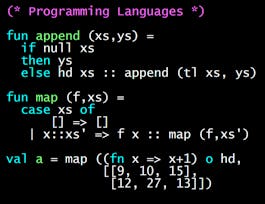This course is for experienced C programmers who want to program in C++. The examples and exercises require a basic understanding of algorithms and object-oriented software.



C++ For C Programmers, Part B
This course is part of multiple programs.

Instructor: Ira Pohl
Sponsored by IEM UEM Group
58,801 already enrolled
(325 reviews)
What you'll learn
Use the Standard Template Library.
Apply inheritance logic and C++ syntax.
Describe and compare Min-Max and the Alpha-Beta algorithm for game playing.
Skills you'll gain
Details to know

Add to your LinkedIn profile
4 assignments
See how employees at top companies are mastering in-demand skills

Build your subject-matter expertise
- Learn new concepts from industry experts
- Gain a foundational understanding of a subject or tool
- Develop job-relevant skills with hands-on projects
- Earn a shareable career certificate


Earn a career certificate
Add this credential to your LinkedIn profile, resume, or CV
Share it on social media and in your performance review

There are 5 modules in this course
This module looks at the architecture of the Standard Template Library. It is especially important to understand how iterators are used to access container to produce highly efficient generic algorithms. The module also includes the important new style of function object—the lambda expression.
What's included
16 videos1 reading
This module shows how Hex can be played as a game on a graph. This involves its representation as an undirected graph in C++. The module explores the inheritance logic and syntax of C++. A principal example is the base class student and a derived class grad_student.
What's included
14 videos1 reading1 peer review
This module explains Min-Max and the Alpha-Beta algorithm for game playing. Its programming topics include C++ 11 Move semantics and a detailed example of referential garbage collection.
What's included
11 videos1 reading
This module shows how to use Monte Carlo evaluation in complex games such as Hex and Go. This had led top championship level play in both these games. The module discusses C++ assertions and exceptions for error handling and the new C++ 11 feature static asserts. Finally, the last part of the module introduces the idea of “Design Pattern”, a feature of modern OO programming.
What's included
16 videos1 reading1 peer review
This module contains three practice exams (which you can take as many times as you'd like) and the final exam, which is worth X% of your grade in this course.
What's included
4 assignments
Instructor

Offered by
Why people choose Coursera for their career




Learner reviews
325 reviews
- 5 stars
69.84%
- 4 stars
17.84%
- 3 stars
5.84%
- 2 stars
1.84%
- 1 star
4.61%
Showing 3 of 325
Reviewed on Nov 24, 2021
Liked the split between looking at new features in C++ and working on a reasonable sized and reasonably complex assignment.
Reviewed on Mar 22, 2020
Course is well structured and have sharp learning curve. Sense of achievement after completing this course.
Reviewed on Jul 7, 2020
I wish that there was some interactive aspect of the class, like mentors or teaching assistants to ask questions of. But besides that, I learned a lot. Thanks.
Recommended if you're interested in Computer Science

University of Washington

University of Illinois Urbana-Champaign

University of London

Open new doors with Coursera Plus
Unlimited access to 10,000+ world-class courses, hands-on projects, and job-ready certificate programs - all included in your subscription
Advance your career with an online degree
Earn a degree from world-class universities - 100% online
Join over 3,400 global companies that choose Coursera for Business
Upskill your employees to excel in the digital economy



